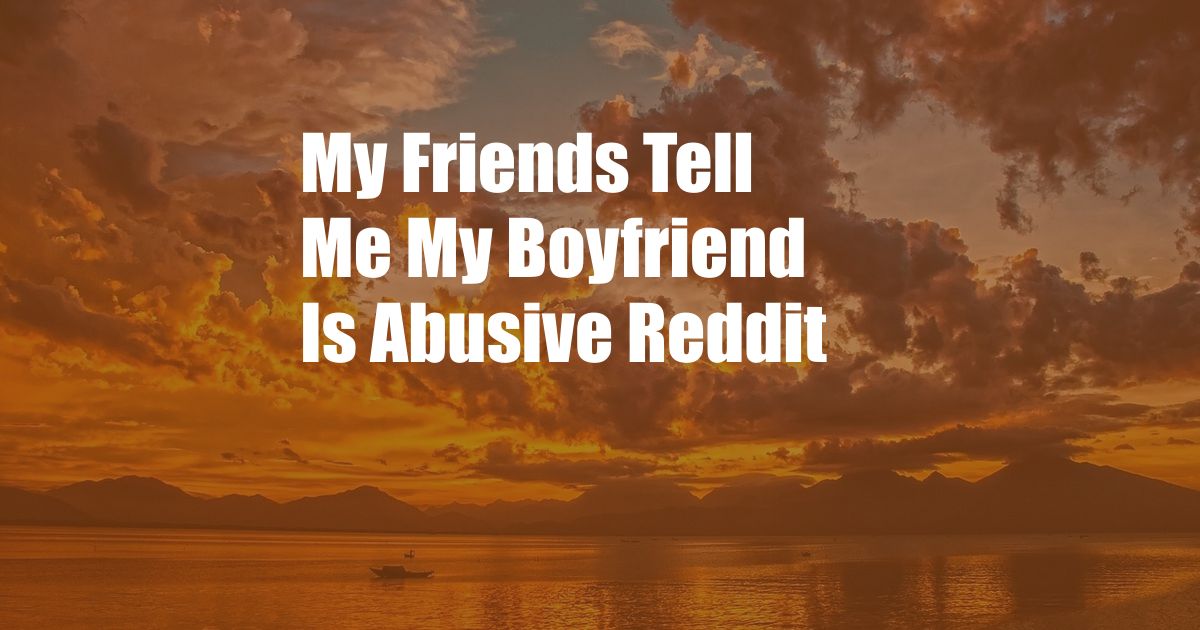
My Friends Tell Me My Boyfriend Is Abusive: A Guide for Understanding Relationship Abuse
In the tapestry of life, relationships play a pivotal role. Yet, not all relationships are woven with strands of love and respect. When suspicion whispers in your ear, it can be daunting to confront the possibility that the person you hold dear may be abusing you. If your friends have shared their concerns, it’s crucial to embark on a journey of self-reflection and seek support to discern the truth.
Navigating the complexities of relationship abuse requires awareness and understanding. This comprehensive guide will shed light on the nature of abuse, its insidious forms, and the steps you can take to protect yourself. Remember, you are not alone. Seeking help is a courageous act that can empower you to break free from a harmful situation and reclaim your well-being.
Recognizing the Spectrum of Abuse
Abuse, like a chameleon, can manifest in various forms. It’s not limited to physical violence but extends to emotional, verbal, sexual, and financial control. Emotional abuse involves manipulation, humiliation, and isolation, leaving you feeling worthless and undermined. Verbal abuse, through insults, threats, and put-downs, aims to erode your self-esteem and silence your voice.
Sexual abuse encompasses any form of unwanted or coerced sexual activity, stripping you of your autonomy and violating your bodily integrity. Financial abuse involves controlling your resources, preventing you from accessing money, and leaving you economically dependent. Recognizing the different forms of abuse is essential for understanding the subtle yet harmful ways it can impact your life.
Understanding the Cycle of Abuse
Abuse often follows a cyclical pattern, leaving you feeling trapped in a whirlwind of emotions. The cycle begins with the “honeymoon” phase, where your partner showers you with love, affection, and apologies. This phase creates a false sense of hope and makes it difficult to leave the relationship.
However, the facade of love quickly crumbles, transitioning into the “tension-building” phase. During this stage, your partner’s behavior becomes increasingly erratic and controlling. They may become verbally or emotionally abusive, isolating you from friends and family and undermining your self-worth.
The tension escalates until it reaches a peak, culminating in the “explosion” phase. This is when physical or severe emotional abuse occurs, leaving you shattered and afraid. The cycle then returns to the “honeymoon” phase, creating a false sense of hope that keeps you trapped.
Tips for Navigating Relationship Abuse
Breaking free from an abusive relationship requires courage, self-belief, and support. Here are some tips and expert advice to guide you on your journey:
- Trust your instincts: If you feel something is wrong, pay attention to your gut feelings. Don’t dismiss your concerns or allow others to minimize them.
- Seek support from trusted individuals: Confide in friends, family members, or a therapist who can provide a safe space and support you through the process.
- Gather evidence: Document any instances of abuse, including text messages, emails, or physical injuries. This evidence can be crucial for seeking legal protection.
- Create a safety plan: Develop a plan for how you will escape in case of an emergency. Identify safe places to go, people to contact, and resources to access.
- Educate yourself: Learn about abuse, its signs, and the resources available to support you. Empowerment through knowledge is key.
Frequently Asked Questions on Relationship Abuse
Q: Can abuse happen in any type of relationship?
A: Yes, abuse is not limited to romantic relationships and can occur in friendships, family relationships, and even workplaces.
Q: Why do people stay in abusive relationships?
A: Many reasons can contribute to staying in an abusive relationship, including fear, shame, financial dependence, and lack of support.
Q: What are the long-term effects of relationship abuse?
A: Abuse can have severe and lasting psychological, emotional, and physical consequences, including depression, anxiety, PTSD, and physical injuries.
Conclusion
Understanding the complexities of relationship abuse is essential for breaking free from its clutches and reclaiming your well-being. If you suspect that you may be in an abusive relationship, remember that you are not alone. Reach out for support, seek professional help, and take the necessary steps to protect yourself. Your safety and happiness are paramount.
We encourage you to share your thoughts and experiences in the comments section. Your insights can help raise awareness and empower others on this crucial journey.